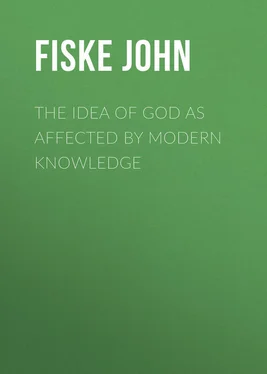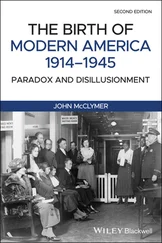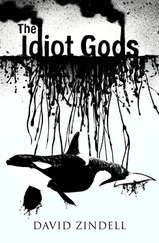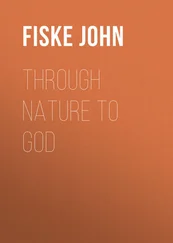John Fiske - The Idea of God as Affected by Modern Knowledge
Здесь есть возможность читать онлайн «John Fiske - The Idea of God as Affected by Modern Knowledge» — ознакомительный отрывок электронной книги совершенно бесплатно, а после прочтения отрывка купить полную версию. В некоторых случаях можно слушать аудио, скачать через торрент в формате fb2 и присутствует краткое содержание. Жанр: foreign_antique, foreign_prose, на английском языке. Описание произведения, (предисловие) а так же отзывы посетителей доступны на портале библиотеки ЛибКат.
- Название:The Idea of God as Affected by Modern Knowledge
- Автор:
- Жанр:
- Год:неизвестен
- ISBN:нет данных
- Рейтинг книги:4 / 5. Голосов: 1
-
Избранное:Добавить в избранное
- Отзывы:
-
Ваша оценка:
- 80
- 1
- 2
- 3
- 4
- 5
The Idea of God as Affected by Modern Knowledge: краткое содержание, описание и аннотация
Предлагаем к чтению аннотацию, описание, краткое содержание или предисловие (зависит от того, что написал сам автор книги «The Idea of God as Affected by Modern Knowledge»). Если вы не нашли необходимую информацию о книге — напишите в комментариях, мы постараемся отыскать её.
The Idea of God as Affected by Modern Knowledge — читать онлайн ознакомительный отрывок
Ниже представлен текст книги, разбитый по страницам. Система сохранения места последней прочитанной страницы, позволяет с удобством читать онлайн бесплатно книгу «The Idea of God as Affected by Modern Knowledge», без необходимости каждый раз заново искать на чём Вы остановились. Поставьте закладку, и сможете в любой момент перейти на страницу, на которой закончили чтение.
Интервал:
Закладка:
Such a serious misstatement of my position, made in perfect good faith by two thinkers so conspicuous for ability and candour, shows that, in spite of all the elaborate care with which the case was stated in "Cosmic Philosophy," some further explanation is needed. It is true that there are expressions in that work which, taken singly and by themselves, might seem to imply a total rejection of theism. Such expressions occur chiefly in the chapter entitled "Anthropomorphic Theism," where great pains are taken to show the inadequacy of the Paley argument from design, and to point out the insuperable difficulties in which we are entangled by the conception of a Personal God as it is held by the great majority of modern theologians who have derived it from Plato and Augustine. In the succeeding chapters, however, it is expressly argued that the total elimination of anthropomorphism from the idea of God is impossible. There are some who, recognizing that the ideas of Personality and Infinity are unthinkable in combination, seek to escape the difficulty by speaking of God as the "Infinite Power;" that is, instead of a symbol derived from our notion of human consciousness, they employ a symbol derived from our notion of force in general. For many philosophic purposes the device is eminently useful; but it should not be forgotten that, while the form of our experience of Personality does not allow us to conceive it as infinite, it is equally true that the form of our experience of Force does not allow us to conceive it as infinite, since we know force only as antagonized by other force. Since, moreover, our notion of force is purely a generalization from our subjective sensations of effort overcoming resistance, there is scarcely less anthropomorphism lurking in the phrase "Infinite Power" than in the phrase "Infinite Person." Now in "Cosmic Philosophy" I argue that the presence of God is the one all-pervading fact of life, from which there is no escape; that while in the deepest sense the nature of Deity is unknowable by finite Man, nevertheless the exigencies of our thinking oblige us to symbolize that nature in some form that has a real meaning for us; and that we cannot symbolize that nature as in any wise physical, but are bound to symbolize it as in some way psychical. I do not here repeat the arguments, but simply state the conclusions. The final conclusion (vol. ii. p. 449) is that we must not say that "God is Force," since such a phrase inevitably calls up those pantheistic notions of blind necessity, which it is my express desire to avoid; but, always bearing in mind the symbolic character of the words, we may say that "God is Spirit." How my belief in the personality of God could be more strongly expressed without entirely deserting the language of modern philosophy and taking refuge in pure mythology, I am unable to see.
There are two points in the present essay which I hope will serve to define more completely the kind of theism which I have tried to present as compatible with the doctrine of evolution. One is the historic contrast between anthropomorphic and cosmic theism regarded in their modes of genesis, and especially as exemplified within the Christian church in the very different methods and results of Augustine on the one hand and Athanasius on the other. The view which I have ventured to designate as "cosmic theism" is no invention of mine; in its most essential features it has been entertained by some of the profoundest thinkers of Christendom in ancient and modern times, from Clement of Alexandria to Lessing and Goethe and Schleiermacher. The other point is the teleological inference drawn from the argument of my first Concord address on "The Destiny of Man, viewed in the Light of his Origin."
When that address was published, a year ago, I was surprised to find it quite commonly regarded as indicating some radical change of attitude on my part, – a "conversion," perhaps, from one set of opinions to another. Inasmuch as the argument in the "Destiny of Man" was based in every one of its parts upon arguments already published in "Cosmic Philosophy" (1874), and in the "Unseen World" (1876), I naturally could not understand why the later book should impress people so differently from the earlier ones. It presently appeared, however, that none of my friends who had studied the earlier books had detected any such change of attitude; it was only people who knew little or nothing about me, or else the newspapers. Whence the inference seemed obvious that many readers of the "Destiny of Man" must have contrasted it, not with my earlier books which they had not read, but with some vague and distorted notion about my views which had grown up (Heaven knows how or why!) through the medium of "the press;" and thus there might have been produced the impression that those views had undergone a radical change.
It would be little to my credit, however, had my views of the doctrine of evolution and its implications undergone no development or enlargement since the publication of "Cosmic Philosophy." To carry such a subject about in one's mind for ten years, without having any new thoughts about it, would hardly be a proof of fitness for philosophizing. I have for some time been aware of a shortcoming in the earlier work, which it is the purpose of these two Concord addresses in some measure to remedy. That shortcoming was an imperfect appreciation of the goal toward which the process of evolution is tending, and a consequent failure to state adequately how the doctrine of evolution must affect our estimate of Man's place in Nature. Nothing of fundamental importance in "Cosmic Philosophy" needed changing, but a new chapter needed to be written, in order to show how the doctrine of evolution, by exhibiting the development of the highest spiritual human qualities as the goal toward which God's creative work has from the outset been tending, replaces Man in his old position of headship in the universe, even as in the days of Dante and Aquinas. That which the pre-Copernican astronomy naively thought to do by placing the home of Man in the centre of the physical universe, the Darwinian biology profoundly accomplishes by exhibiting Man as the terminal fact in that stupendous process of evolution whereby things have come to be what they are. In the deepest sense it is as true as it ever was held to be, that the world was made for Man, and that the bringing forth in him of those qualities which we call highest and holiest is the final cause of creation. The arguments upon which this conclusion rests, as they are set forth in the "Destiny of Man" and epitomized in the concluding section of the present essay, may all be found in "Cosmic Philosophy;" but I failed to sum them up there and indicate the conclusion, almost within reach, which I had not quite clearly seized. When, after long hovering in the background of consciousness, it suddenly flashed upon me two years ago, it came with such vividness as to seem like a revelation.
Читать дальшеИнтервал:
Закладка:
Похожие книги на «The Idea of God as Affected by Modern Knowledge»
Представляем Вашему вниманию похожие книги на «The Idea of God as Affected by Modern Knowledge» списком для выбора. Мы отобрали схожую по названию и смыслу литературу в надежде предоставить читателям больше вариантов отыскать новые, интересные, ещё непрочитанные произведения.
Обсуждение, отзывы о книге «The Idea of God as Affected by Modern Knowledge» и просто собственные мнения читателей. Оставьте ваши комментарии, напишите, что Вы думаете о произведении, его смысле или главных героях. Укажите что конкретно понравилось, а что нет, и почему Вы так считаете.












